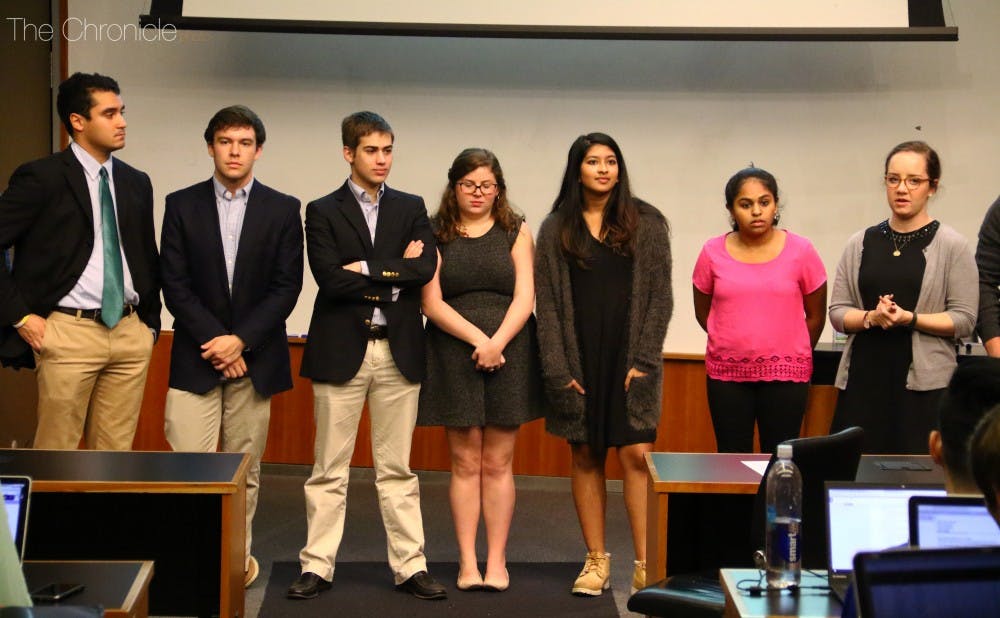After weeks of discussion, Duke Student Government passed election reform legislation in an attempt to make the election process easier for voters and increase voter turnout.
The modifications to election bylaw—introduced by Jackson Dellinger, senator for Durham and regional affairs, and senator for academic affairs Kushal Kadakia, both freshmen, and Executive Vice President John Guarco, a junior—change the format of the voting system from an instant runoff in which a voter musk rank all candidates for a position to an instant runoff system in which the voter has the option of ranking as few or as many candidates as they wish.
“It all started with the incredibly low turnout at the freshmen elections and the many complaints from the student body,” explained Kadakia. “We wanted to fix the system to make it easier to vote.”
The proposed system has changed in the past several weeks during DSG debate. At first, senators proposed moving from an instant runoff system to a plurality system in which students vote for only two candidates for each position, as opposed to ranking them.
Dellinger, who was in part responsible for coming up with the new system, explained that this system will allow voters freedom to rank as many candidates as they want while still providing enough information to the Board of Elections.
“The general idea [behind this system] is that the more information a voter gives you, the better the results are going to be in terms of capturing the wants of a class,” Dellinger said. “However, it can be a logistical struggle for the voter to have to rank 15 candidates.
He compared the new system to the old runoff system—in which voters had to rank all candidates—and the plurality system initially proposed several weeks ago
“With this system, we get a happy medium where you only have to put in as much information as you actually want to, but we can still use all of that information,” he said.
In addition to the bylaw changes, DSG voted to move $25,000 from the surplus fund to the Student Organization Funding Committee’s programming fund. SOFC chairman Nikhil Gavai, a senior, explained that high numbers of programming requests had depleted the programming fund and that the $25,000 was needed for the last two weeks of programming requests before winter break. Once SOFC receives its spring budget, it will return $25,000 to DSG’s surplus fund.
Gavai also explained that SOFC would be revising its programming funding guidelines for the spring semester in order to avoid borrowing money from DSG again.
“The number of programming requests we’ve received every year has increased while our budget has not,” Gavai noted. “We have to create new guidelines in order to insure that we can best serve all of the diverse interests on Duke’s campus.”
In other business:
DSG passed a resolution in support of an on-campus voting site for the 2016 primary election. Sophomore Liz Brown and freshman Nia Moore, both senators for Durham and regional affairs, introduced the resolution, explaining that when Duke has hosted a voting site, voter turnout is much higher than when students are forced to go off-campus.
DSG approved the funding of $4,440 to Duke Mock Trial to host its annual Tobacco Road Invitational mock trial competition in the Durham County Courthouse next weekend.
DSG also approved the chartering of the Duke chapter of Apprentice Doctor, which provides hands-on clinical training and increased exposure to medicine for premedical students.
DSG voted to uphold a Financial Oversight and Appeals Committee decision to deny the funding of a $3,765 trip to a competition for five members of the Duke Chess Club, on the grounds that it is not open to the general student body.
Finally, DSG passed a DSG Research Unit bylaw which would move up the timeline for the committee’s research projects. The bylaw was introduced by Guarco and other senators.
Correction: This story was updated to clarify who introduced the DSGRU bylaw changes. The Chronicle regrets the error.
Get The Chronicle straight to your inbox
Sign up for our weekly newsletter. Cancel at any time.

